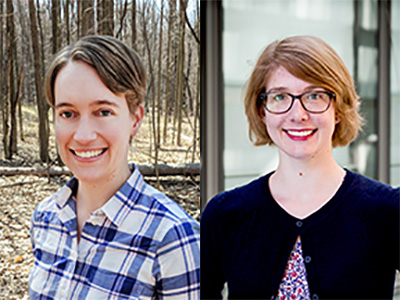News Archive
Professors Paradine and Kennedy each win MIRA award from NIH

Congratulations to Shauna Paradine and Rose Kennedy, both assistant professors of chemistry, for being recent recipients of the Maximizing Investigators’ Research Award (MIRA, R35) from the National Institutes of Health (NIH)! Dr. Paradine's proposal was titled “Discovering catalytic strategies for transition metal-catalyzed reactions to construct topologically complex organic scaffolds.” Dr. Kennedy's proposal was titled "Mechanistic Insights into Catalytic Acyl C-O and C-N Activation and Cross Coupling".
Dr. Paradine and coworkers plan to develop novel catalytic strategies to enable the efficient and selective construction of organic molecules that are sp3-rich (i.e., highly three-dimensional). Organic compounds that are sp3-rich are attractive for the development of new drugs to treat human diseases, but because of their complexity, there are few general chemical reactions to construct these sorts of compounds, and as such they are underrepresented in drug discovery relative to sp2-rich (i.e., highly two-dimensional) compounds. Dr. Paradine’s group seeks to advance novel strategies in transition metal catalysis that will bridge this gap in the synthesis of molecules with relevance to human health. For example, they discovered that compounds derived from urea are good ligands for palladium catalysis, especially for functionalizing carbon-carbon double bonds, leading to the efficient construction of two new bonds in one chemical step. In another area, they have found that tuning the reactants and ligands in reactions catalyzed by copper can change reaction pathways to allow for new functionalization reactions using oxygen from the air we breathe. This funding will allow the Paradine group to push these research areas into new directions, resulting in new chemical reactions to access a diverse range of functional molecular scaffolds.
Meanwhile, Dr. Kennedy and coworkers plan to study a burgeoning class of cross-coupling reactions that use terrestrially abundant metals to enable cross-coupling with oxygen and nitrogen-containing reaction partners. Although palladium-catalyzed cross coupling reactions were recognized with the 2010 Nobel Prize in Chemistry for its transformative role in the synthesis of small-molecule therapeutics and other functional molecules, there is a strong drive to move away from this precious metal and the halogen-containing reactants it requires.
Nickel-catalyzed cross-coupling methods allow reactivity with O- and N-containing functional groups are common in bioderived and bioactive small molecules and could therefore offer a greatly expanded scope of sustainably sourced cross-coupling partners. However, these methods still face practical limitations that have been difficult to overcome due to a lack of detailed mechanistic into the features responsible. Kennedy and her team plan to addresses these ambiguities through systematic mechanistic investigation of three-distinct classes of nickel-catalyzed cross-coupling with biologically important acyl C–O and C–N electrophiles. Understanding these catalyst systems is essential for designing next-generation methodologies for the selective, efficient, and sustainable synthesis of small-molecule therapeutics. The ultimate goal of this project area is to achieve mechanism-driven improvements bringing these methodologies—which use terrestrially abundant metals to elaborate biologically abundant functional groups—to a level competitive with or superior to established, palladium-catalyzed cross-coupling alternatives for pharmaceutical development.
Dr. Paradine received her BA in chemistry from Albion College, where she performed research under the guidance of Dr. Andrew French. She then moved to the University of Illinois at Urbana-Champaign, where she pursued her PhD studies in chemistry with Professor M. Christina White. Shauna’s PhD research centered on the development of new catalytic strategies for C-H amination reactions with first-row transition metal catalysts. In 2015, she joined Professor Eric Jacobsen’s group at Harvard University as an NIH postdoctoral fellow, where she developed enantioselective, multicomponent allylation reactions using hydrogen bond donor catalysis. She joined the chemistry faculty at University of Rochester in 2018.
Dr. Kennedy earned her BS in chemistry here at the University of Rochester, where she performed undergraduate research with Professors Kara Bren and Alison Frontier. She then moved to Harvard University where she pursued her PhD studies in chemistry with Professor Eric Jacobsen as an NSF Graduate Research Fellow. Rose’s PhD research centered in the design and mechanistic study of enantioselective reactions enabled by chiral anion-binding organocatalysts derived from ureas and thioureas. She then completed postdoctoral training with Professor Paul Chirik at Princeton University as an NIH postdoctoral fellow, where she developed a family of iron-catalyzed cycloaddition reactions between feedstock hydrocarbons to generate novel building blocks with applications in biofuels, fragrances, polymeric materials, and pharmaceutical synthesis. She returned to the University of Rochester as a member of the chemistry faculty in 2020.
The NIH Maximizing Investigators Research Award (MIRA) is an investigator-focused grant supporting research that falls within the mission of NIGMS. The goal of this award is providing investigators with greater stability and flexibility in their research programs.
